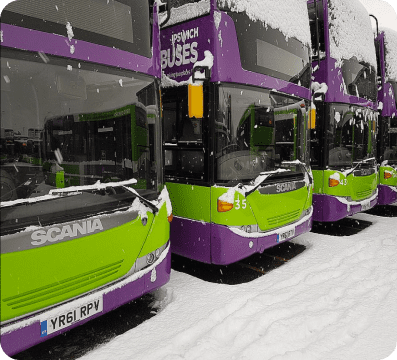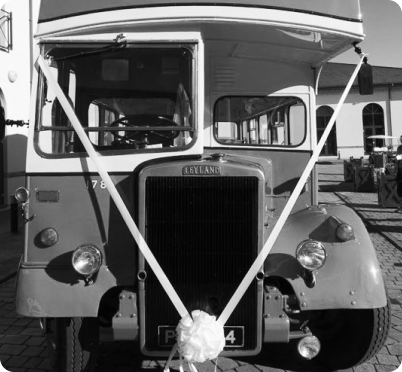About Us
About Us
Who We Are
Keeping Ipswich & Suffolk Moving since 1903
Ipswich Buses is proud to have been transporting its customers to their places of work, education and their family and friends for over 120 years. It is our mission to provide dependable, high-quality, value-for-money services that meet the needs and aspirations of the people and communities we serve.
Our fleet of 75 buses provides a comprehensive transport network to the people of Ipswich and the surrounding areas, covering enough distance to drive to the moon over ten times! The 5.5 million customers who use our services each year are among some of the most satisfied bus users in the country, giving us an 87% overall satisfaction rating in the independent Transport Focus Satisfaction survey (2023).
It is our ultimate aim to provide the transport option of choice for Ipswich & Suffolk and drive the transition to sustainable travel. We understand this will only be achieved by continued focus and investment in customer experience, by looking forward and embracing positive change, and by continually reviewing and improving what we do.
If you are interested in our long history, please keep reading!


Our History
In The Beginning...
Our origin dates back to October 1880, when a private tramway company provided the first affordable mass public transport service in the town. Initial services were horse-drawn along Wherstead Road, Bramford Road and Derby Road. With the horse and driver at the front, a conductor was required to collect fares and supervise passenger safety. Bells and whistles were essential communication aids for the crews in those days.
The Ipswich Corporation
The Ipswich Corporation (the forerunner of today’s Borough Council) was able to purchase the horse tramway in 1901. They established a transport and electricity supply undertaking, which allowed the building of our present depot in Constantine Road and a power station, initially fuelled by burning domestic refuse. This electricity provided power for the new dark green and cream liveried electric trams, and the horses were no longer needed. The network expanded upon the commencement of the municipal service in 1903. Services expanded to serve destinations to Lattice Barn and along Felixstowe Road.
The tramway network used 35 trams ‘cars’, which although open-topped and open-fronted, were used in all weathers. The Great War of 1914-1918 prompted a change of operation, as restrictions on supply and materials meant the tram rails wore out and operation became problematic. The electrical infrastructure remained in useable condition, so in 1923, three ‘trackless trams’ arrived. At last, the driver had an enclosed cab and could remain dry while at the controls! Three years later, the successful trial of ‘trackless’ between Cornhill and Ipswich Station concluded with them replacing the trams entirely. Thirty ‘trackless trolley vehicles’, later commonly referred to as trolleybuses, were locally built by Ransomes of Ipswich and Garretts of Leiston.
The Royal Show in Chantry Park in 1934 marked the start of double-deck operation. Ransomes again provided smart green and cream liveried trolleybuses complete with distinctive silver aluminium panels. Network expansion in the 1920s and 1930s introduced routes along Foxhall Road, Heath Road and Sidegate Lane; new routes had to be confined within the borough boundaries. The hub of operations in the town Centre was Cornhill and Electric House, adjacent to Tower Ramparts School. In 1937, a purpose-built trolleybus depot at Priory Heath came into use. Today this building is home to the the Ipswich Transport Museum.
The Second World War of 1939 to 1945 brought restrictions. Worker’s travel took priority over leisure and shopping, and evening services were restricted. ‘Utility’ trolleybuses with wooden seats were allocated to the town to help update the fleet, and many of the pre-war trolleybuses were rebuilt, surviving until replaced in the 1950s. Female drivers and conductors were permitted for the first time, to replace males serving in the forces. A far cry from the diverse workforce that is the public face of our operations today!
In the post-war period, Ipswich grew. Chantry, Maidenhall, Whitehouse, Whitton and Castle Hill Estates required new routes to serve the large housing developments which replaced some of the old pre-war terraced housing near the town centre. It was originally expected that trolleybuses would serve these new areas, but history was to prove otherwise.
From Trolley Buses to Motor Buses
Six diesel ‘motorbuses’ began operating in May 1950 as a trial. They looked handsome in Ipswich Green and Cream livery and did not have distinctive silver panels like the trolleybuses. By 1953 it was decided that the flexibility of operating motorbuses without wires and associated infrastructure was a significant advantage and as cost effective. Thus, the fate of electric traction was sealed, and trolley operations were wound down. By the end of August 1963, trolleybuses were gone, along with the forest of wires, poles and fittings that lined their routes, and 64 diesel buses prevailed.
Ipswich Borough Transport
Ipswich Borough Transport was established to replace the Corporation undertaking in 1974. The next decade saw the rapid introduction of driver-only vehicles to reduce costs, and buses with drivers and conductors finished in 1986. Tower Ramparts, known to many as ‘Electric House’ was established as the principal ‘town’ bus station in 1975 and reliance on Cornhill, Lloyds Avenue and Crown Street as principal town centre stops diminished. The closure of Lloyds Avenue arch and subsequent pedestrianisation of the town centre in 1981 established a pattern of operation that forms the basis of our daily operations to this day!
…and Finally…. Ipswich Buses
Ipswich Buses as we know it today was established in 1986 when the bus industry was largely privatised.
Though we proudly remain owned by Ipswich Borough Council; we run and operate independently.

Ipswich Buses Mobile App
The Ipswich Buses mobile app allows you to purchase and validate bus tickets on Ipswich Bus vehicles. You can also search for particular stops and check scheduled departure times for your route.
Mobile Tickets
Bus Stops
Journey Info
Ipswich Buses Mobile App
The Ipswich Buses mobile app allows you to purchase and validate bus tickets on Ipswich Bus vehicles. You can also search for particular stops and check scheduled departure times for your route.
Mobile Tickets
Bus Stops
Journey Info